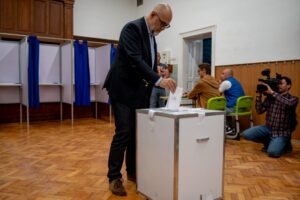
Hunor Kelemen said that Crin Antonescu could be such a leader.Continue reading

The second round of the repeat presidential elections in Romania on May 18 will certainly be a test of strength between George Simion, the leader of the Alliance for the Union of Romanians (AUR) and candidate of the far-right parties, and Nicușor Dan, the independent mayor of Bucharest.
Simion came in first in the first round of voting with 40.96%. Dan came in second with 20.99%. Crin Antonescu, the candidate of the governing coalition of Social Democrats, National Liberals and the Democratic Alliance of Hungarians of Romania (RMDSZ), came third with 20.07%. The former prime minister of the Social Democratic Party, Victor Ponta, who ran as an independent, won 13.05% of the vote, while Elena Lasconi, leader of the progressive Save Romania Union Party (USR), who came second in the annulled first round last year and would have qualified for the second round that did not take place, came in fifth with 2.68% of the vote.
Dan said on Sunday evening that the second round would be difficult and that it was not a fight between individuals, but between the anti-Western and pro-Western forces. According to Krónika, the former USR leader especially thanked the citizens of Moldova, who are also Romanian nationals, where he won with more than 50%. The nationalist Simion, on the other hand, won 60% of the vote in the very large Romanian diaspora in the West, which flocked to the ballot boxes abroad.
Neither Crin Antonescu nor Elena Lasconi encouraged voters to vote for Nicușor Dan in the second round. Victor Ponta left it open which candidate he would support in the second round.
This means that Georgescu’s “hard man” is the clear favorite going into the second round.
Common sense dictates that we should support Nicușor Dan in the second round, said RMDSZ chairman Hunor Kelemen on Kossuth Radio on Monday morning. The leading politician of the Hungarian minority spoke of a “strong protest vote” against the political establishment. He emphasized that the pro-Western candidate has a difficult “feat” to accomplish, namely to win over the votes of the defeated candidates, otherwise “a victory for Simion would be tragic for the Hungarian community, but also a great danger for the country.”
Kelemen suspected that it was not the consequence of the Hungarian community’s vote that Antonescu did not make it to the second round. The interest of his Hungarian-speaking compatriots was to prevent the victory of a politician who would destroy the democratic achievements of the Hungarian community after the fall of communism.
The RMDSZ leader pointed to Dan’s ideological home, which is clearly in the progressive camp, but emphasized his experience in local politics.

Hunor Klemen casting his vote. Photo: MTI/Kiss Gábor
When asked how he thought the European Union would react to a possible Simion victory, the “kingmaker” of the ruling coalition ruled out the possibility of EU interference: “It will neither come to save Romania from its economic budget problems (…) nor to save the ethnic minorities.” He was thus indirectly addressing the dilemma of Hungarian political representation in Romania. The RMDSZ took part in what critical observers of the Bucharest party landscape call a “coup d’état.” The annulment of the first round of elections in December 2024, took place with the blessing of the eternal Hungarian junior partner of the Romanian ruling coalitions.
The noble goal of preventing an obviously anti-Hungarian presidential candidate does not hide the fact that this was done by questionable means,
which were approved by the representative body of the country’s largest national minority.
The rather modest voter turnout among ethnic Hungarians also points to another problem: The massive support of Antonescu, a representative of the “system” hated by the majority of Romanian citizens and consisting essentially of national liberals and social democrats, raised many questions. The credibility of the RMDSZ has suffered damage as a result, which cannot be remedied by a renewed, penetrating election recommendation in favor of the incumbent mayor of Bucharest. Many Transylvanian Hungarians are increasingly refusing to be used as electoral masses for the often not entirely transparent political goals of the RMDSZ.
It is not only the internal Hungarian opposition that accuses the RMDSZ leadership of cooperating too closely with the Romanian parties responsible for the adventurous budgetary policy, nepotism, and democratic deficits. The swing policy, which has a long tradition in Transylvania dating back to the time of the independent principality, requires adaptability, but does not release the country from its moral obligation to strive for the best interests of the country, including its own ethnic group, regardless of the self-interests of the elites.
Via MTI; Featured Image: MTI/Veres Nándor